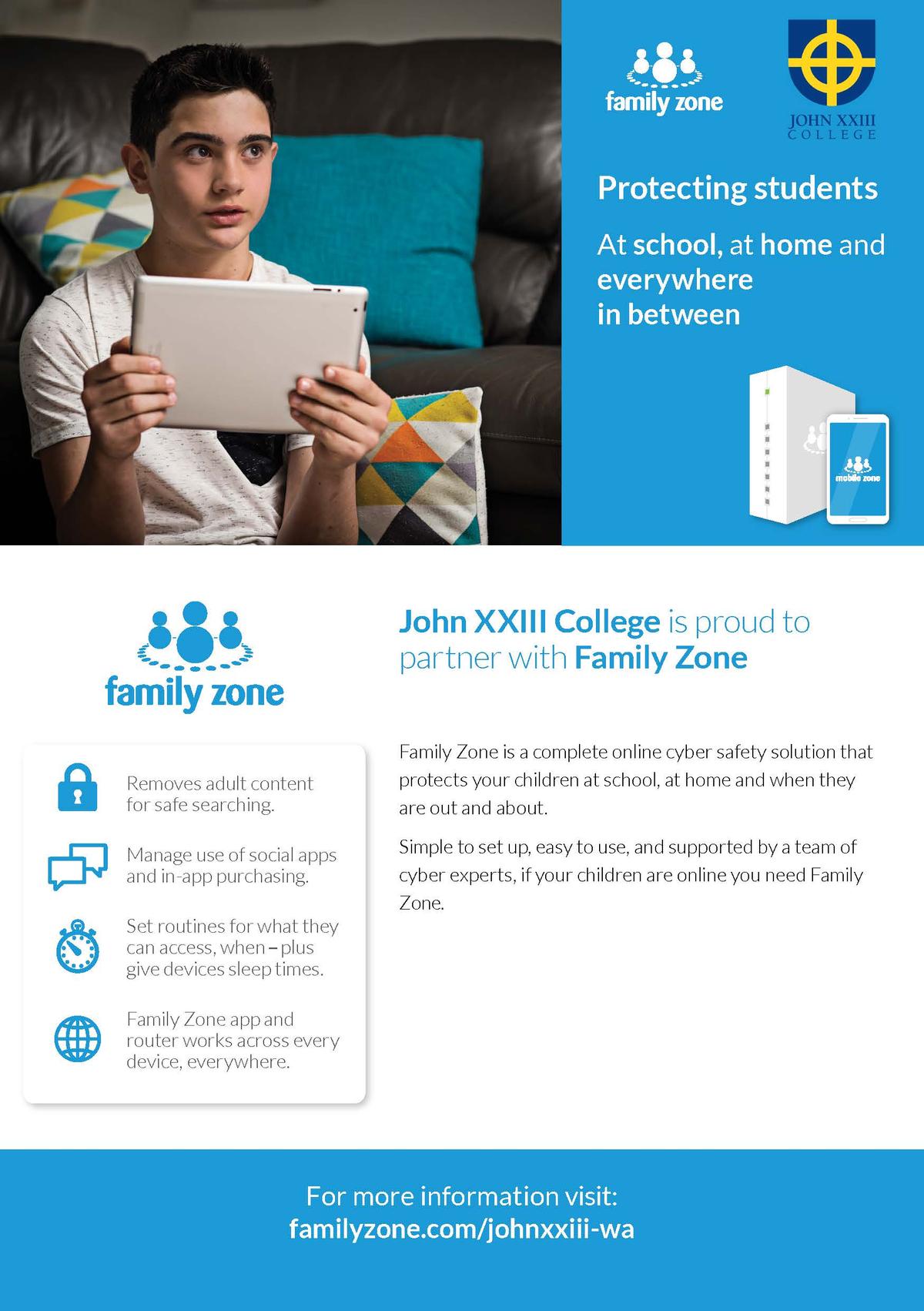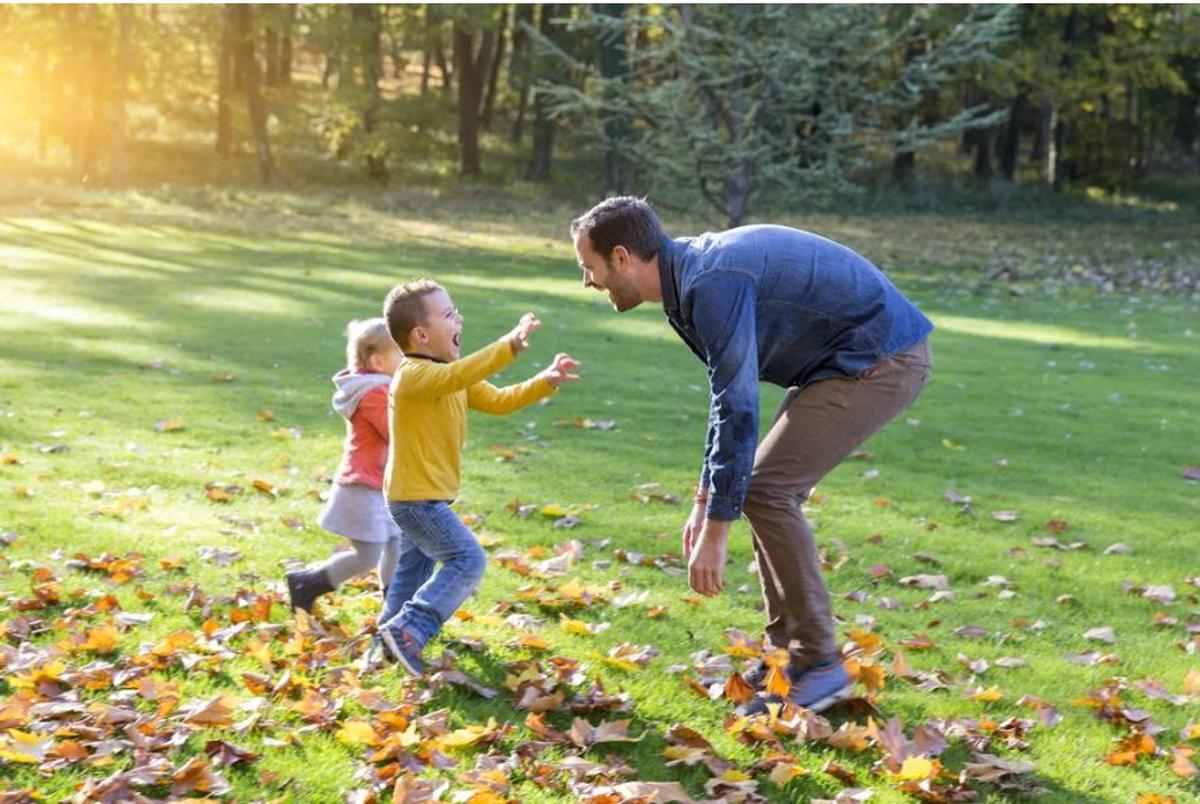Family Zone & Cyber Safety

Download Family Zone
Make use of the Family Zone Accounts which we are offering to John XXIII College families for free, as part of our College contract negotiations until 2020.
By setting up a private Family Zone account, you can apply age-appropriate parental controls on every device your child has access to, in any location. To find out more visit https://www.familyzone.com/johnxxiii-wa
Family Zone Webinar recordings
For those that were unable to make the Family Zone webinars, we have recorded both sessions for you to view in your own time, and they are available here: https://www.familyzone.com/johnxxiii-wa
Webinar topics are:
- Getting Started with Family Zone
- Advanced with Family Zone
Study highlights need for "playlight savings"
Too many Aussie kids are literally leading a sheltered life, prompting calls for “playlight savings” to redress a striking imbalance between indoor and outdoor play.
A new study has found over 70% of Australian children spend less than an hour a day outdoors. And only half of families are spending time with their kids outdoors more than twice a week.
Parents say kids’ “lack of interest” and “lack of time” are the two biggest drivers in the trend toward an increasingly indoor life. But kids seem to be finding plenty of time to spend on their devices.
For a third of children, in fact, screen-time beat out outdoor play by a factor of two to one.
There was surprising variation state-by-state in screen-time totals. South Australian children had the highest engagement, spending an average of 17.4 hours per week on a device, compared to Western Australia kids with a comparatively low 10.3.
For a third of children, screen-time beat out outdoor play by a factor of two to one.
The term “playlight savings” refers to rules that specifically encourage outdoor play.
For the Stepanova family from Forestville NSW, for example, “We have a rule at home where if it’s light outside, there’s no TV.” As long as the sun is out and the weather is fine, children Anton, 12, Maya, 10 and Yana, 6, need to play outside.
Why? “Their mood is better, they sleep better. It’s just clear they are happier and healthier,” observes mum Elena.
“They’re like zombies if they spend too long in front of the screen. They get grumpy and super frustrated.”
Why “playlight” matters
Experts say it’s not just a case of kicking the kids off their screens and out the back door. Families need to spend time together - as opposed to each hunched separately over individual screens.
Although less time on devices is a benefit all by itself, there are six additional reasons why outdoor play is essential for children's wellbeing, according to experts from the Harvard Medical School.
1. Sunshine. Our bodies need sun exposure to make vitamin D, a vitamin that plays a crucial role in many body processes, from bone development to our immune system, sleep patterns and mood.
2. Exercise. Children should be active for an hour every day. Period. And heading outdoors with a ball or bikes is an effortless way he obvious way to achieve this.
3. Executive function. These are the skills that help us plan, prioritize, troubleshoot, negotiate, multitask and exercise our creativity. Outdoor play gives kids opportunities to practice these important life skills.
4. Taking risks. Risk-taking is growth. Climbing trees, building forts, exploring beyond the front gate ... If we never let them leave their comfort zone except by way of a gaming console, we are depriving them of the opportunity to cultivate curiosity, confidence and bravery.
5. Socialization. Children need to learn how to work together without a grown-up laying down the ground rules. Outdoor play that is unstructured and social is an essential proving ground for growing children.
6. Appreciation of nature. If a child never gets to walk through the bush, or see animals outside of a zoo, if she never gets to wander along a river foreshore or lie under a tree and watch clouds billow across the sky, how will she ever learn to cherish our natural environment? It's no exaggeration to say the future of our planet depends on our children - they need to feel a part of it, and learn to appreciate it.
“Playlight” tips from the experts
- Schedule one afternoon a week to spend an extra hour outdoors as a family.
- Involve the kids in decision-making to ensure you get buy-in.
- Give the new routine a bit of sizzle, with a name like Magical Monday or Free-for-all Friday.
- But keep it simple - a picnic supper near the beach, a walk along the river, or even just a game of kickball in the park will do.
- Once you’ve established the routine, build on it. If one hour once a week was fun, why not extend it to twice a week or more?


